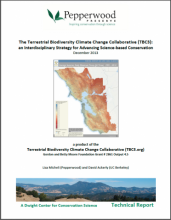The Terrestrial Biodiversity Climate Change Collaborative (TBC3): an Interdisciplinary Strategy for Advancing Science-based Conservation

The Terrestrial Biodiversity Climate Change Collaborative (TBC3) used the question of how to evaluation a landscape's resilience to climate change as a starting point to launch its two-year initiative focused on creating a scientific knowledge-base applicable to management of the San Francisco Bay Area's Conservation Lands Network. Recognizing the Bay Area’s complex landscape, well known for its diversity of microclimates, the TBC3 created a high-resolution bio-physical knowledge-base in order to understand how ecosystems may respond to climate change at spatial scales relevant to conservation. An innovative component of this project was to evaluate not just climate (i.e. air temperatures and precipitation), but to translate climate variables to their potential impacts on watershed hydrology, which in the region's water-limited environment is a key control on the distribution of life. The effort uses the California Basin Characterization Model (BCM) Dataset to forecast local watershed hydrology, thereby integrating the effects of topography, soils, geology and other landscape facet attributes that mediate local climate-ecosystem relationships.
This technical report describes the group's approach to lay a foundation with this comprehensive set of integrated fine-scale climate and hydrology map layers for both historic conditions and future projections for the Bay Area region, and, with this in hand, their goals and next steps for near- and long-term research to focus on a better understanding of the potential mechanisms of ecosystem change due to short- and long-term variability in primary climate-hydrology drivers.
Micheli, E., and D. Ackerly. 2013. The Terrestrial Biodiversity Climate Change Collaborative (TBC3): an Interdisciplinary Strategy for Advancing Science-based Conservation. Technical Report, Dwight Center for Conservation Science, Santa Rosa, CA.
